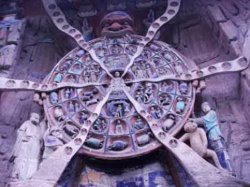Exoteric Buddhism and Esoteric Buddhism: Buddha, Wittgenstein, and Me
There are two major divisions within Buddhism, exoteric Buddhism (顕教) and esoteric Buddhism (密教).
Early Buddhism was exoteric. Buddha's original teaching was very simple. Our lives are full of pain and nobody can run away from it. There is nothing eternal and everything is changing in this world. He said that we should just accept this.
In other words, it is the truth that there was no way to escape our painful lives, but we just had to accept such a cruel truth. It is too hard for ordinary people to accept it.
Then esoteric Buddhism appeared. Esoteric Buddhism insisted that there was the truth that was hidden and only higher ascetic disciples could reveal it. I think that Buddha clearly denied such a thought, but ordinary people might want to think that there was a secret help in this world.
In esoteric Buddhism, many disciples tried radical training to realize the secret truth, but Buddha told that radical training would never give the truth to any disciplinant, and he realized the truth just in peace meditation.
As I wrote in the entry "Wittgenstein, Barbara Minto, and Me," I am now reading Ludwig Wittgenstein's "Tractatus Logio-Philosophicus." I think that he was similar to Buddha.
Ludwig Wittgenstein was of Jewish origin, but his mother was converted to Catholicism and he, himself, was baptized. In World War I, when he was a soldier of the Austro-Hungarian army, he read Leo Tolstoy's "The Gospel in Brief," and got a deep faith in Catholicism.
In "Tractatus Logio-Philosophicus," he tried to show the limit of what could be expressed in language. The last sentence of this book is "Whereof one cannot speak, thereof one must be silent." He thought that God was what on could not be spoken, so he didn't find any value to hear preach and go to church.
Buddha told that everyone had to realize the truth only by themselves. Wittgenstein might believe that there was no secret truth that only priests knew and the truth was open to everyone equally.
I like Buddha's own original teaching. I believe that I should accept what this world is and what I really am, and stay here and struggle against my own life in this world. There is no utopia out of this world and my life.
